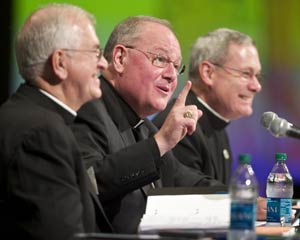 Archbishop Timothy M. Dolan of New York, president of the U.S. Conference of Catholic Bishops, center, speaks during the opening session of the bishops’ annual spring meeting near Seattle in Bellevue, Wash., June 15 At left is Archbishop Joseph E. Kurtz of Louisville, Ky., USCCB vice president, and Msgr. David Malloy, general secretary. Msgr. Malloy finished his term as general secretary at the meeting and will become administrator of St. Francis de Sales Parish, Lake Geneva, Aug. 1. (CNS photo/Stephen Brashear) BELLEVUE, Wash. — The U.S. bishops June 16 approved a policy statement on physician-assisted suicide, the first on the issue by the bishops as a body, and they also approved revisions to their 2002 “Charter for the Protection of Children and Young People.”
Archbishop Timothy M. Dolan of New York, president of the U.S. Conference of Catholic Bishops, center, speaks during the opening session of the bishops’ annual spring meeting near Seattle in Bellevue, Wash., June 15 At left is Archbishop Joseph E. Kurtz of Louisville, Ky., USCCB vice president, and Msgr. David Malloy, general secretary. Msgr. Malloy finished his term as general secretary at the meeting and will become administrator of St. Francis de Sales Parish, Lake Geneva, Aug. 1. (CNS photo/Stephen Brashear) BELLEVUE, Wash. — The U.S. bishops June 16 approved a policy statement on physician-assisted suicide, the first on the issue by the bishops as a body, and they also approved revisions to their 2002 “Charter for the Protection of Children and Young People.”
The votes came on the second day of the bishops’ annual spring general assembly held near Seattle in Bellevue June 15-17.
Taking on the issue of physician-assisted suicide in the state where voters most recently approved it, the U.S. bishops hope to counter the recent “strong resurgence” in activity by the assisted suicide movement, said Cardinal Daniel N. DiNardo of Galveston-Houston, chairman of the U.S. Conference of Catholic Bishops’ Committee on Pro-Life Activities, in presenting the document a day before the vote.
In the document, titled “To Live Each Day With Dignity” and approved in a 191-1 vote, the U.S. bishops declared assisted suicide “a terrible tragedy, one that a compassionate society should work to prevent.”
It says if advocates of assisted suicide succeed in their campaign to see it legalized in more and more states, “society will undergo a radical change.”
The revisions to the charter were approved 187-5, with four abstentions. They reflect changes in church law since the last revision in 2005, bringing it into line with recent Vatican instructions in response to the crisis of sexual abuse of minors by priests. These include mentioning child pornography as a crime against church law and defining the abuse of someone who “habitually lacks reason,” such as a person with mental retardation, as the equivalent of child abuse.
They also outline procedures to follow if a bishop is accused of having sexually abused a child and another bishop becomes aware of it.
The experiences of the past nine years have shown that “the charter works,” said Bishop Blase J. Cupich of Spokane said June 15. As chairman of the USCCB Committee on the Protection of Children and Young People he introduced the document to the bishops June 15.
“The charter has served the church well,” he said. “It is a helpful tool as we keep our pledge to protect children, promote healing and rebuild trust.”
The next day before the vote there was little debate on the proposed revisions. But not every bishop is on board with the charter’s provisions, as evidenced by the 28 amendments proposed by Bishop Fabian W. Bruskewitz of Lincoln, Neb., and rejected by the committee.
Most of the amendments suggested by Bishop Bruskewitz were aimed at weakening the charter’s wording because, the bishop said in a rationale included with the amendments, “The USCCB bureaucracy cannot bind bishops to obey the charter.”
Retired Archbishop Francis T. Hurley of Anchorage, Alaska, also raised questions June 16 about the “zero tolerance” policy outlined in the charter, which requires the permanent removal of any priest who admits or is found to have abused a child.
But at a news conference held later in the day, Bishop Cupich said a change in the policy would send the message that “we are going to put priest offenders first,” and that is not the case, he said. “We are putting the victims first.”
Earlier in the day, the U.S. bishops voted overwhelmingly to authorize preparation of a 50-page document on preaching for consideration in November 2012.
St. Louis Archbishop Robert J. Carlson presented the proposal on behalf of the Committee on Clergy, Consecrated Life and Vocations, which he chairs, but said the document would be drawn up in consultation with various committees of the U.S. Conference of Catholic Bishops.
Archbishop Carlson said the document would be “at once inspirational and practical, … grounded in the tradition of the church” and would aim to “adequately convey the purpose of the homily at Mass: the personal encounter with the Incarnate Word.”
In other action on the first day of the assembly, the bishops also:
- Got an update from Bishop Salvatore J. Cordileone of Oakland, Calif., about the conference’s efforts to promote and defend marriage.
- Approved, 185-1-3, the use of the Mass texts for patronal feast days of Spanish-speaking countries as an appendix to the eventual Spanish translation of the Roman Missal for use in the United States.
- Dropped from their agenda without comment a discussion of their perennial “Faithful Citizenship” document on political responsibility.
- Bid farewell to Msgr. David Malloy, a priest of the Archdiocese of Milwaukee, who was completing five years of service as USCCB general secretary. Msgr. Malloy will become administrator of St. Francis de Sales Parish, Lake Geneva, Aug. 1.
